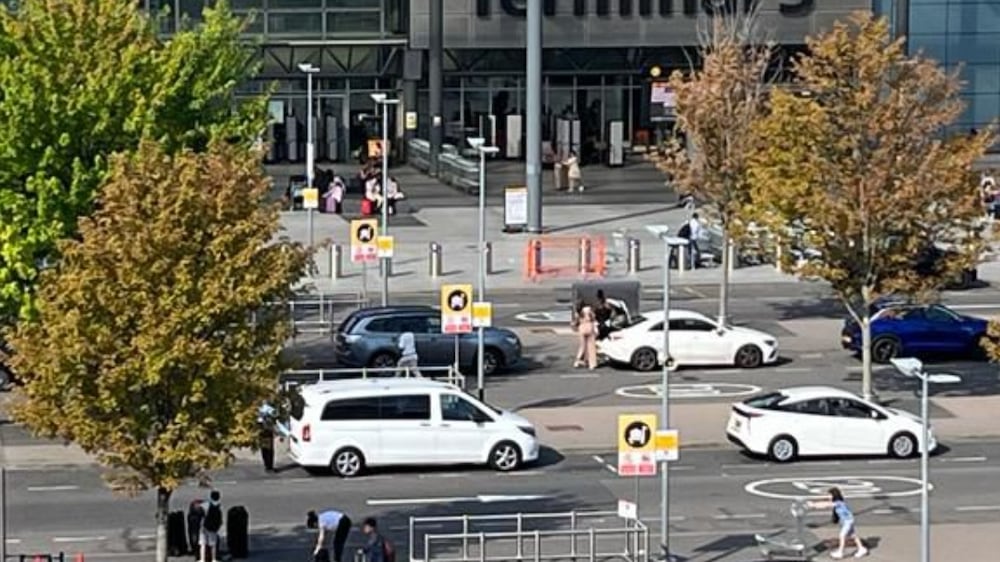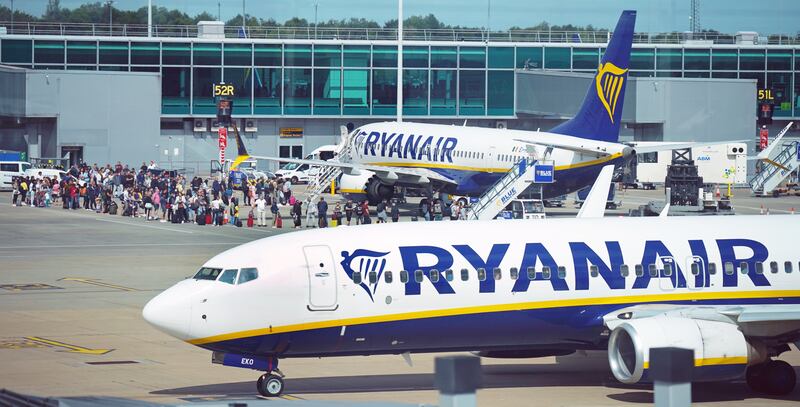With airlines forced to cancel hundreds of services under capacity limitations before the summer peak, flying around Europe was already set to be a challenge this year.
Now there are warnings of severe disruption and the potential cancellation of thousands of flights, with getaways affected in particular by the prospect of strikes by French air-traffic controllers.
With the school holidays just around the corner, airlines are on tenterhooks waiting to see if unions announce last-minute strike action.
French air-traffic controllers have been striking in response to President Emmanuel Macron’s proposed pension reforms, which are due to come into effect in September. More strikes are threatened before then.
France plays a central role in the European air-traffic control system, with so many planes flying over its territory.
While the country has Minimum Service Laws, which were introduced in 2007 to prevent the complete closure of its air space, it also tweaked the rules last year. Authorities can, and do, prioritise flights from its territory. This puts overflights in jeopardy when cancellations are ordered.
Travel has already been severely disrupted in the first six months of the year by the strikes, with more than 3,000 flights cancelled, 23,000 journeys delayed and about 10.7 million passengers affected. In the six months to June 30, airport workers were on strike for a total of 60 days and action by air-traffic controllers amounted to more than 30 days.
'Strikes in France could ruin summer holidays'
John Strickland, an aviation consultant and director of JLS Consulting, told The National he believes French strikes are a big threat this summer.
“French air traffic control is critical not only for flights within, to and from France, but also for overflying traffic on key north/south routes such as UK/Ireland to Spain and Portugal, which are popular summer holiday markets,” he said.
“If strikes take place then such services are subject to potentially lengthy delays or even cancellations. In addition pressure is put on other air-traffic control zones, which may have to handle rerouted flights.
“On top of this there are manpower shortages in some parts of Europe this summer, which compounds the challenges which airlines face.”
Third of all European flights affected by strike action in France
Eurocontrol, which manages the continent's airspace, said during 34 days of protest action in France in March and April, a third of all European flights were affected every day.
“While France was particularly affected, neighbouring countries also suffered significant delays and cancellations, even for flights that were planned to overfly France rather than take-off or land there,” it said.
“Reactionary or knock-on delays also affected subsequent flights and punctuality for the network as a whole dropped from 80 per cent to 71 per cent. Each strike day saw an additional 1,200 tonnes of CO2 emissions, as aircraft had to fly an extra 96,000km.”
Last year France even introduced a ban on some domestic flights to places that could be serviced by high-speed trains in a bid to cut emissions but the strike action retains it ability to create a stranglehold.
War in Ukraine has reduced airspace by 20 per cent
Raul Medina, Eurocontrol's director general, told a meeting of the Airports Council International that increased military activity due to the war in Ukraine had reduced available airspace by up to 20 per cent and as a result the industry will face a challenging summer if industrial action occurs.
“This summer in Europe is challenging as we have less available airspace because of the war in Ukraine and the military needs. We need everyone to play their part. Airports need to be well staffed,” he said.
“Recent industrial action caused many delays. We can manage situations like that in quieter periods but if it happens in the middle of summer, it will be much more challenging.”
Claudia Brosche, a legal expert at Flightright, which helps passengers claim compensation, told The National it is expecting a summer of chaos.
“During the summer holidays, there will probably be many flight delays and cancellations again,” she said.
“There is also a risk of further strikes in the airline sector, which will once again cause chaos, especially if they fall during the summer holidays and thus in the peak travel season.”
Ryanair calls on EU to protect overflights
Low-cost airline Ryanair has revealed more than 900 flights were cancelled last month due to strikes in France.
The Dublin-based airline said about 160,000 passengers were affected by the cancellations.
It was the worst affected airline with a daily average of 332 flights delayed, followed by Air France (277) and easyJet (256).
Last month, Ryanair’s Michael O'Leary handed the EU Commission a petition calling for new policies to protect overflights during French strikes.
He has warned the strikes risk “shutting everybody down”.
“These repeated air-traffic control strikes have unfairly forced airlines to disproportionately cancel thousands of EU overflights from Germany, Spain, Italy, the UK and Ireland, while France in particular uses Minimum Service Laws to protect their domestic/short-haul flights while cancelling overflights,” Ryanair said.
“This is unfair. France (and all other EU states) should use Minimum Service Laws to protect overflights during the strikes as they do in Greece, Italy and Spain.
“If unions insist on striking, which is their right, then they should cancel flights to/from the affected state and protect overflights, not cancel EU overflights from Germany, Spain, Italy and the UK.
“The EU Commission must now take urgent action and insist that all states protect overflights.”
Its calls have been backed by Airlines for Europe (A4E), which represents continental carriers.
“Member airlines were forced to cancel over 2,000 flights as a result of the different calls for strikes, with millions of travellers affected also through associated delays,” it said in a statement.
“This trend shows no sign of abating. As we head into the summer months, A4E member airlines strongly fear more strikes will continue to severely impact passengers, create delays and costs, while also undermining the environmental efforts of the aviation sector due to additional fuel burnt and increase in CO2 emissions caused by the route changes to avoid affected airspace.
“These disruptions are concentrated in a small number of EU countries but may have EU-wide impacts on air traffic. In general, the cost of these disruptions is borne almost entirely by the users of the air-traffic system, rather than by the providers.”
Workers vote for summer strike action across Europe
It is not merely issues in France that are cause for concern. Already, strikes have taken place at London’s Heathrow Airport, in Spain and in Italy.
The Spanish Union of Airline Pilots (Sepla) has announced it is considering strike action during the summer.
Its members include employees of Air Nostrum, Air Europa, Iberia, Iberia Express, Vueling, Ryanair, easyJet, Norwegian, Swiftair, Plus Ultra, Jet 2, Eurowings and Evelop.
However, under Spanish law a minimum of 90 per cent of flights must continue so that legislation will reduce the impact.
In the UK, the Unite union has announced key workers will strike at Glasgow Airport and about 100 security and technical staff at Birmingham Airport are set to walk out from July 18.
It could lead to delays for airlines including Wizz, Ryanair, Lufthansa and Emirates.
Security staff have recently called off strikes at Heathrow Airport, which last year descended into chaos with cancelled flights and disruption.
Last summer 18 million people passed through Heathrow, making it the busiest airport in Europe over the period.
Watch: The National checks out Heathrow travel chaos

Aside from airline chaos, there will be disruption for UK rail passengers with members of the RMT union are due to strike on July 20, 22 and 29. It will affect 14 rail operators and cause havoc for train services across the country.
In Italy, air-traffic controllers are due to walk out on July 15 and on the same day pilots in Belgium are threatening strike action.
“Airports and airlines have taken some measures to be better prepared for the large influx of passengers,” Ms Brosche said.
“However, we believe that the measures taken, such as increasing staff and automating security checks, are not sufficient to ensure smooth operations at the airports.”
Covid is still hindering aviation industry
Beverley Boden, head of finance, marketing and performance at Teesside University International Business School, said Covid was continuing to play a part in the process.
“As air travel returns to pre-Covid levels a year earlier than aviation analysts predicted, passengers will experience delays and a slightly different level of service,” she told The National.
“It is inevitable that strike action in the aviation industry is causing disruption and financial losses for both passengers and airlines. The increase in air travel … has contributed to these challenges.

“Airports struggling to attract and retain staff, as well as other operational issues, are making advance flight planning and scheduling difficult for airlines.”
She said passengers should be prepared for a summer of misery.
“As millions of Britons prepare to embark on a summer holiday, many will need to brace themselves before take-off as we’re set for another summer of disruption in the skies,” she said.
“It is anticipated that strike action will continue throughout 2023, with misery for many who have planned for a well-earned break during tough economic times.”







